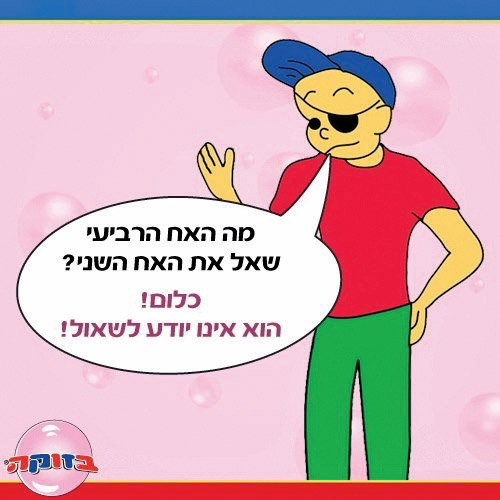
Solution:
Bazooka asked: What did the fourth brother ask the second brother?
The answer is nothing because he doesn’t know how to ask…
Teacher’s Corner:
One of my students was embarrassed to ask a question in Hebrew, so I encouraged him to try. He tried and he succeeded! I was so thrilled with the question and the effort that I thanked my student. If you don’t ask you don’t learn.
Asking a question is a powerful way to learn and to develop a deeper understanding and knowledge of languages and life. As I told my student, asking questions naturally improves our emotional intelligence, which in turn makes us better questioners and better listeners. Much attention is focused on the 4 questions at the Passover Seder. The focus on the children and the strange and unusual customs that we practice is, we are taught, designed to encourage the children to ask questions.
In fact, the structure of the Seder is not only to interest the children so they ask questions, but it also provides a pedagogical framework to teach children the process of how to ask questions. On a deeper level, it teaches children to be observant of their surroundings and to pay close attention to their environment. More importantly perhaps, asking a question is one side of a conversation and the other side is typically an answer which requires attentiveness to understand what is being communicated. To be present and to hear. The Seder is teaching our children the art of communication! Even if we are conducting the Seder by ourselves we still are obligated to ask the 4 questions and to listen to ourselves answer them. We are being reminded to be present for ourselves.
I frequently encourage my students to ask questions because you never know where the answers may take you. Don’t worry that you may be asking the right question or that you might be embarrassed because you are asking the wrong question – there is no wrong question because the practice of asking a question teaches you how to ask and elevates your abilities so that you will know more after you have received an answer than before you asked the question! Don’t worry, be happy and ask more questions!
If my students understood how beneficial questioning can be, they would end far fewer sentences with a period—and more with a question mark.
May we all be blessed to have a wonderful Seder. Chag Sameach!
For individual, family or group tutoring in Hebrew, all levels, please email yayhebrew@gmail.com. Maya Yehezkel is a Hebrew teacher at Yeshivat Noam middle school.









